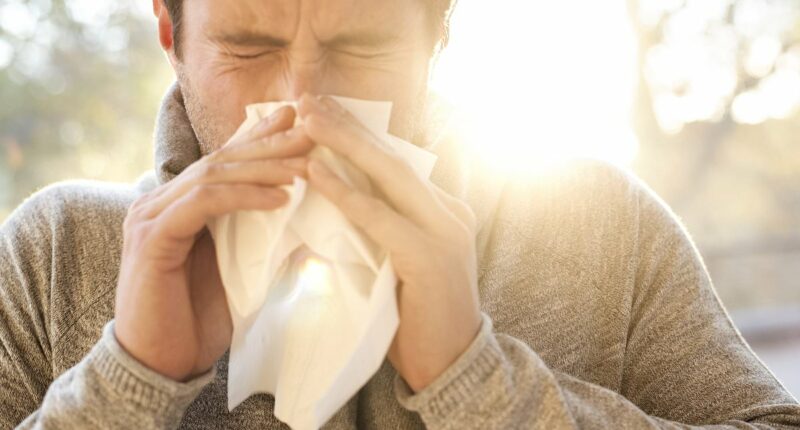Share this @internewscast.com
A prominent pharmacist has highlighted the lesser-known risks of discontinuing hay fever medications abruptly and the signs that might indicate you are experiencing withdrawal symptoms.
Hay fever season typically runs between late March to September when pollen counts are at their peak.
Hay fever is an allergic reaction to pollen, a fine powder produced by plants. Pollen levels are higher during the spring and summer when plants are in bloom.
The reaction usually happens when pollen comes into contact with someone’s eyes, nose, mouth or throat.
The minuscule seeds and plant spores can trigger symptoms such as coughing, sneezing, a runny or blocked nose, itchy, red or watery eyes, and itching in the throat, nose, mouth, or ears, as well as headaches and fatigue.
Relief usually only comes after taking antihistamines—which can come as tablets, liquids, eye drops and nasal sprays.
There are two main types of antihistamines, like chlorphenamine, which can cause drowsiness, and non-drowsy options like acrivastine.
In more severe cases, medical professionals might prescribe corticosteroids, a type of steroid often administered as a nasal spray, like Flixonase, which helps by reducing inflammation.

Deborah Grayson, dubbed the ‘Godmother of Pharmacology’, has urged people to taper off of hay fever medication gradually
“Many people take these for one to two weeks during flare-ups, and that doesn’t significantly impact the body,” explained the pharmacist, “But if used for four weeks or more, it can significantly diminish the body’s natural production capabilities.”
Regardless of which hay fever medications you’re setting aside until next spring, Deborah Grayson, a pharmacist with three decades of experience, advised in the Daily Mail that it’s crucial to be aware of withdrawal symptoms, which can be severe and, in some cases, life-threatening.
They can include itching, nausea, vomiting, headaches, sweating, anxiety, and dizziness—all common symptoms of other conditions—which can hide the fact that you’re experiencing withdrawals.
Ms Grayson warned that it is particularly vital to taper off corticosteroids slowly, as there is a real danger of life-threatening complications.
‘The way they work is to mimic the hormone cortisol that comes from the adrenal glands.
‘So, because you’re taking the corticosteroids, the body doesn’t realise it doesn’t produce cortisol itself, and it switches itself off.
‘So, if you suddenly stop the steroids without weaning off, it takes too long for the body to realise it has to kick in, and it almost mimics a condition called Addison’s disease which is when the adrenal glands stop working completely.’
Addison’s disease is when the adrenal glands don’t produce enough cortisol, causing symptoms like fatigue, weight loss, muscle weakness and salt cravings.

Ms Grayson explained that mysterious scratch marks may be due to you unknowingly itching at night while coming off of the medication
‘Because usually that itch and scratch is worse overnight. We tend to get a lot hotter as we approach the evening, so it may well be that they are having a hives flare up, because the antihistamines aren’t there to dampen it anymore.’
Ms Grayson continued: ‘They do eventually come back online, but in the period of time it takes for them to come back online, you can have what is called an Addisonian crisis which can be fatal.’
The NHS says Addisonian crisis is a medical emergency that needs immediate treatment, as it can cause seizures, loss of consciousness, stroke and a cardiac arrest.
Worryingly, she says there are few early warning signs that this complication is occurring. ‘A lot of people just end up collapsing and having to be blue-lighted to A&E,’ she said.
However, in less severe cases, there are signs you may be suffering from withdrawal symptoms when stopping antihistamine medications, like mysterious scratch marks on your skin.
She explained: ‘If you tend to get hives, it may well be that when you’re asleep, when you’re not having the benefit of antihistamine, you might be scratching more without realising.
But there are things you can do to prevent withdrawal symptoms.
Ms Grayson said: ‘The key for all of these medications is to taper them as slowly as possible, always under medical supervision. The more sensitive you are, the slower you need to go.
‘If symptoms become unbearable after a dose reduction, it is usually a sign that the taper needs to be slowed further.’
She added: ‘Managing stress and ensuring plenty of rest can help in some cases. Staying well hydrated, taking gentle exercise, eating healthy, prioritising sleep and practicing relaxation may also help.
‘Having something to occupy the mind, such as a hobby, puzzles or crafts, can also provide useful distraction during withdrawal.’












